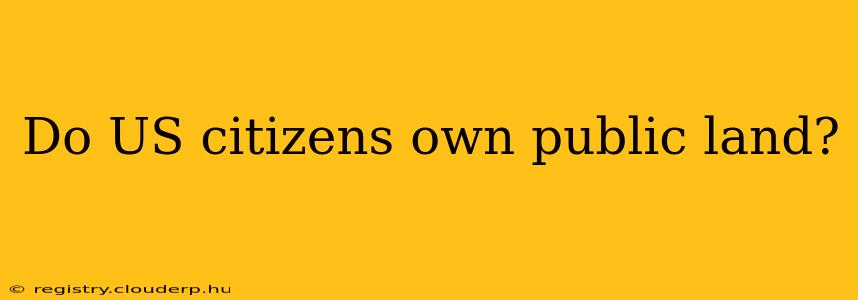Do US Citizens Own Public Land? Understanding Public Land Ownership in the United States
The question of whether US citizens own public land is a complex one, demanding a nuanced understanding of land ownership and the federal government's role. The simple answer is: no, US citizens do not own public lands in the sense of private ownership. However, the relationship between citizens and public lands is far more intricate than a simple yes or no.
Public lands in the US are managed by various federal agencies, primarily the Bureau of Land Management (BLM), the US Forest Service (USFS), the National Park Service (NPS), and the Fish and Wildlife Service (FWS). These agencies hold the land in trust for all Americans, ensuring its preservation and responsible use for current and future generations.
This means that while individual citizens don't possess individual deeds to portions of public land, they do possess certain rights and privileges related to it. These rights are carefully defined and regulated to protect the land's resources and ensure equitable access for everyone.
What Rights Do US Citizens Have Regarding Public Lands?
US citizens enjoy a range of rights and privileges related to public lands, including:
-
Recreational Use: This is perhaps the most common way citizens interact with public lands. Activities like hiking, camping, fishing, hunting (where permitted and licensed), and wildlife viewing are generally permitted, often with minimal or no fees. Specific regulations vary by agency and location, however.
-
Access for Resource Extraction: In some cases, citizens and businesses can obtain permits to extract resources from public lands, such as timber, minerals, or grazing rights. These permits are subject to strict environmental regulations and fees, ensuring sustainable practices.
-
Conservation Efforts: Citizens have the right to participate in the management and conservation of public lands through advocacy, volunteering, and engaging in public comment processes on proposed land use plans.
-
Educational Opportunities: Public lands often serve as living laboratories for scientific research and educational purposes, providing access to unique ecosystems and natural resources for study.
What Does It Mean That Public Lands Are Held "In Trust"?
The concept of "in trust" means that the federal government acts as a steward, managing public lands for the benefit of all current and future citizens. This responsibility includes protecting the land's ecological integrity, ensuring sustainable use, and promoting public access where appropriate. It's a concept rooted in the idea of preserving natural resources for the common good.
Can I Build a House on Public Land?
No. Generally, building a permanent structure on public land without proper permits and approvals is illegal. Exceptions exist for specific permitted uses, such as certain mining operations or authorized structures related to resource management, but private residential development is not allowed on most public lands.
Who Manages Public Lands?
As mentioned earlier, several federal agencies manage public lands depending on their designated use and purpose. The BLM oversees vast areas primarily in the western United States, managing grazing, mineral extraction, and recreation. The USFS manages national forests, focusing on timber management, recreation, and watershed protection. The NPS preserves national parks and monuments for historical and natural significance, emphasizing preservation and visitor access. Finally, the FWS manages wildlife refuges and other lands focused on biodiversity conservation.
How Can I Learn More About Public Lands Near Me?
To find out more about public lands in your area, you can visit the websites of the relevant federal agencies: the Bureau of Land Management (BLM), the U.S. Forest Service (USFS), the National Park Service (NPS), and the Fish and Wildlife Service (FWS). These websites offer maps, information on regulations, and details on recreational opportunities. You can also search for local land management offices to inquire directly.
In conclusion, while US citizens don't own public land in the traditional sense of private property, they are the ultimate beneficiaries, possessing significant rights and responsibilities concerning its stewardship and sustainable use. Understanding this relationship is crucial for ensuring the continued preservation and responsible enjoyment of these invaluable natural resources.

